2020届高考英语二轮专题复习之反义疑问句
(完整)高中英语反义疑问句(详细)

反义疑问句反义疑问句(The Disjunctive Question) 即附加疑问句。
它表示提问人的看法,没有把握,需要对方证实。
反义疑问句由两部分组成:前一部分是一个陈述句,后一部分是一个简短的疑问句,两部分的人称时态应保持一致。
主要形式:陈述部分肯定式+疑问部分否定式;陈述部分否定式+疑问部分肯定式。
1简述陈述部分和疑问部分要么前肯后否,要么前否后肯。
这类反义疑问句有时带有感情色彩,表示惊奇,愤怒,讽刺,不服气等。
例如:You call this a day's work,don't you?你说这就叫一天的活儿,不是吗?2句式句子结构1.陈述部分肯定句+疑问部分否定句(可记为前肯后否).例:They work hard, don’t they?2.陈述部分否定句+疑问部分肯定句(可记为前否后肯).例:You didn't go, did you?句子类型一种是反义的附加疑问句;一种是非反义的附加疑问句。
简单来说,就是“前肯后否”或“前否后肯”。
3读法规则反义疑问句陈述部分用降调,问句部分可升可降。
提问者对陈述部分把握较大时,问句部分用降调;反之用升调。
4速记方法前肯后否,前否后肯,前be后be,前情态后情态,前无be或情态后加助,并改为否定,时态一致。
5主语一般词语附加疑问句中主语用和主句一致的主语,用主格。
附加疑问句随从句。
不定代词当陈述部分的主语是(1)one时,后面的疑问句可用one/he.(2)no one时,后面附加疑问句中主语用they。
(3)everything,anything,nothing,something时,附加疑问句中主语用it 不用they(4)this, that,或those, these时,附加疑问句中主语用it或they.(5)everyone,everybody,someone,somebody,anyone,nobody等时,附加疑问句中主语一般用they (口头语,非正式文体)/he(正式文体)。
高考英语反义疑问句

捧起时,任意翻开一章,慢慢读下去,看到的书中情节,都与上一次读时,截然不同的,越读越有新意频生。山也是一样的,拾起一条山径,慢慢走进山去,看到的山光春色更是与上次来时大不相 同了呢。ag平台开户
尤其是鸟鸣,啾啾,唧唧,喳ห้องสมุดไป่ตู้……丝竹乱耳,管弦缭绕,好似一只小手,在心间抓挠着你,酥酥,软软,你会立刻想到:哦,春天呐,万物都在春声里复苏了。
其实,春天的鸟声与别的季节大不相同的,只要你够细心,你自然就会发现的。春天里,最先听到的就是布谷鸟,说来它就是杜鹃的一种,因为它总是发出“布谷、布谷”的叫声,因此人们就叫它 布谷鸟。
布谷鸟总是在春天来时,飞在村庄的头顶上空,很善意的提醒着人们要春播了,就如那诗句:“布谷飞飞劝早耕,舂锄扑扑趁春睛。”只要听到这一声声布谷声,就会听到田野里开始有人声牛声放 水的声音,烟雨微微,春气朦朦,田地里,人们开始忙碌起来,翻地,深耕,插秧,播种……那一种善心与轻柔,好似一位母亲在提醒孩子们,不要懒惰,要勤劳呀,要忙农事了哈。
高三英语反义疑问句

当dare, need 为实义动词时, 疑问部分用助动词 do + 主语。
She doesn't dare to go home alone, does she?
17)省去主语的祈使句的反意疑 问句,疑问部分用will you。 Don't do that again, will you?
Everyone is in the classroom, aren’t they?
Everything begins to grow in spring, doesn’t it?
Nobody will go, will they?
16)带情态动词dare或need的反 意疑问句,疑问部分常用 need (dare ) +主语。
It is a fine day. Let’s go fishing, _sh_a_l_l_w_e_? Let us do this job,_w_i_ll_y_o_u_? Turn on the radio,_w_i_ll_y_o_u_?
18)陈述部分是"there be"结构 的,疑问部分用there省略主语 代词。
15) 陈述部分主语是不定代词 everybody, anyone, somebody, nobody, no one等,疑问部分常 用复数they,有时也用单数he。
Everyone knows the answer, don't they? (does he?) Nobody knows about it, do they? (does he?)
高考英语反义疑问句

窗外田野与山峦的景色,烘托出玉叶婶,内心轻松愉快。(或急切心情)⑵运用神态描写生动形象的写出了玉叶婶得知女儿请他来的原因时欲言又止的情态,表现出他吃惊失望想说而又不愿意说的矛盾心理。 20.示例⑴我同意第一个说法,因为叶婶有“一儿一女一枝花”儿孙绕膝,一家
人其乐融融,安康幸福。示例⑵我同意第二个说法。因为玉叶婶无论在儿子还是女儿家都忙碌劳累,都得不到想要的休息,可见当女儿的也要多关爱父母。 (2017四川泸州))阅读下面的小说,完成11-14题。(16分) 碗底香 陈小庆 ? 终于开饭了,他几乎是跑着奔向食堂的。 ? 今天
那么大个铁盆,足可以吃很饱。 ? 吃完最后一根面条,喝光最后一口汤,盆里只有那个大块头的牛肉了,那深酱色的肉,吸足了调料,那要一口吞下去,能嚼上两分钟才可以咽下去。 ? 他停顿了一下,显得郑重地夹起那块肉,多年养成的习惯,尊重食物,更要慎重对待那些最好的,那
些都是生活的精华,是我们热爱生活的理由!他每次在享受最后一口美味时,都会停顿一下,调整好味觉、视觉,说高级一点应该还调整好了灵魂,准备接受那种痛快舒爽﹣﹣他夹起那块肉,发觉并没有想象中那么沉,也许是自己用劲过于大了吧,他调整了下呼吸,把肉隆重地送入口中,
反义疑问句
(The Disjunctive Question)又 叫附加疑问句。它表示提问人的 看法,没有把握,需要对方证实。 反义疑问句由两部分组成:前一 部分是一个陈述句,后一部分是 一个简短的疑问句,两部分的人 称时态应保持一致。
1.陈述部分肯定式 + 疑问部分 否定式
They work here, don’t they?
就是要把尿。刚刚收拾干净的屋子,一会儿就被他搞得一片狼藉。有时吵着要看电视里的动画片,有时非要奶奶带到外面去玩,到了外面不想走路又要人抱着。到了午睡的点上,不在旁边唱上至少半个小时的摇篮曲,他是不会闭上眼睛的。这小家伙脾气还挺大,稍不如意就又哭又闹。儿
2020届高考英语二轮专题复习之反义疑问句
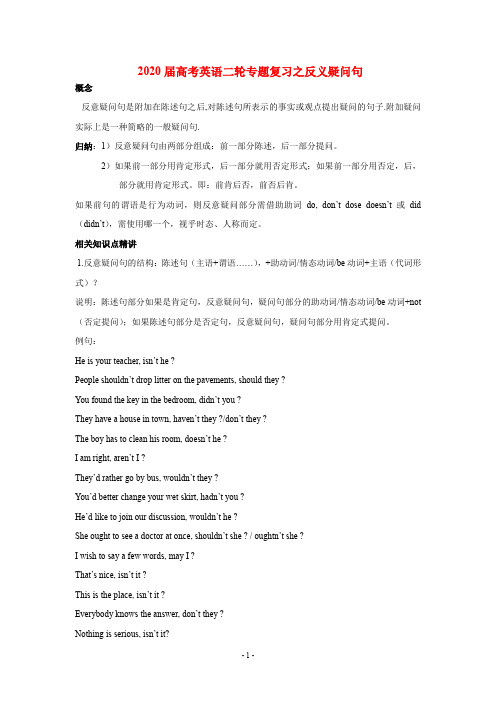
2020届高考英语二轮专题复习之反义疑问句概念反意疑问句是附加在陈述句之后,对陈述句所表示的事实或观点提出疑问的句子.附加疑问实际上是一种简略的一般疑问句.归纳:1)反意疑问句由两部分组成:前一部分陈述,后一部分提问。
2)如果前一部分用肯定形式,后一部分就用否定形式;如果前一部分用否定,后,部分就用肯定形式。
即:前肯后否,前否后肯。
如果前句的谓语是行为动词,则反意疑问部分需借助助词do, don’t dose doesn’t或did (didn’t),需使用哪一个,视乎时态、人称而定。
相关知识点精讲1.反意疑问句的结构:陈述句(主语+谓语……),+助动词/情态动词/be动词+主语(代词形式)?说明:陈述句部分如果是肯定句,反意疑问句,疑问句部分的助动词/情态动词/be动词+not (否定提问);如果陈述句部分是否定句,反意疑问句,疑问句部分用肯定式提问。
例句:He is your teacher, isn’t he ?People shouldn’t drop litter on the pavements, should they ?You found the key in the bedroom, didn’t you ?They have a house in town, haven’t they ?/don’t they ?The boy has to clean his room, doesn’t he ?I am right, aren’t I ?They’d rather go by bus, wouldn’t they ?You’d better change your wet skirt, hadn’t you ?He’d like to join our discussion, wouldn’t he ?She ought to see a doctor at once, shouldn’t she ? / oughtn’t she ?I wish to say a few words, may I ?That’s nice, isn’t it ?This is the place, isn’t it ?Everybody knows the answer, don’t they ?Nothing is serious, isn’t it?There wasn’t enough time at that moment, was there ?There used to a tower here, usedn’t there? / didn’t there ?What you need is more practice, isn’t it ?2.某些特殊句型的反意疑问句:1)祈使句的反意疑问句:表示肯定意义的祈使句,即表示“请求,提示”它的反意疑问句用will you 表达:有时也可以用won’t you 表示。
反义疑问句知识点
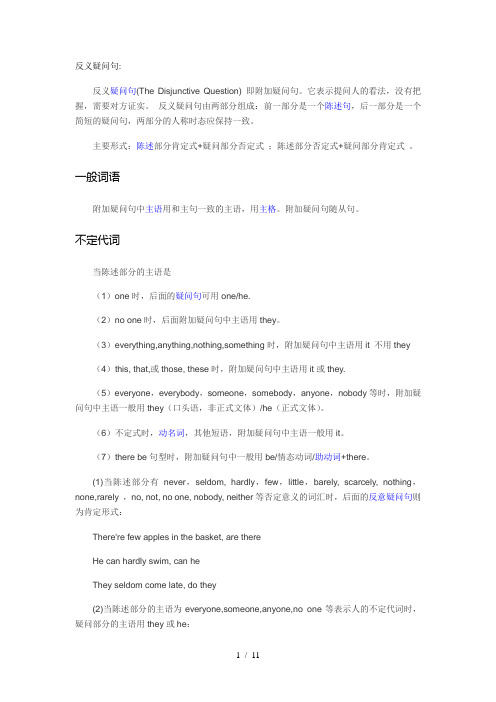
反义疑问句:反义疑问句(The Disjunctive Question) 即附加疑问句。
它表示提问人的看法,没有把握,需要对方证实。
反义疑问句由两部分组成:前一部分是一个陈述句,后一部分是一个简短的疑问句,两部分的人称时态应保持一致。
主要形式:陈述部分肯定式+疑问部分否定式;陈述部分否定式+疑问部分肯定式。
一般词语附加疑问句中主语用和主句一致的主语,用主格。
附加疑问句随从句。
不定代词当陈述部分的主语是(1)one时,后面的疑问句可用one/he.(2)no one时,后面附加疑问句中主语用they。
(3)everything,anything,nothing,something时,附加疑问句中主语用it 不用they(4)this, that,或those, these时,附加疑问句中主语用it或they.(5)everyone,everybody,someone,somebody,anyone,nobody等时,附加疑问句中主语一般用they(口头语,非正式文体)/he(正式文体)。
(6)不定式时,动名词,其他短语,附加疑问句中主语一般用it。
(7)there be句型时,附加疑问句中一般用be/情态动词/助动词+there。
(1)当陈述部分有never,seldom, hardly,few,little,barely, scarcely, nothing,none,rarely ,no, not, no one, nobody, neither等否定意义的词汇时,后面的反意疑问句则为肯定形式:There're few apples in the basket, are thereHe can hardly swim, can heThey seldom come late, do they(2)当陈述部分的主语为everyone,someone,anyone,no one等表示人的不定代词时,疑问部分的主语用they或he:Everyone in your family is a teacher, aren’t they\isn't he?(3)当陈述部分的主语为everything,something,anything.nothing等表示物的不定代词时,疑问部分的主语用it:Something is wrong with your watch, isn’t it(4)当陈述部分含有否定意思的词是unhappy,dislike,unfriendly,等含有否定词缀的派生词,也就是有un,dis,no-前缀、-less后缀等含有词缀而意思否定的词,当做肯定句处理,疑问部分要用否定形式。
高三英语反义疑问句

19)否定前缀不能视为否定词, 否定前缀不能视为否定词, 否定前缀不能视为否定词 其反意疑问句仍用否定形式。 其反意疑问句仍用否定形式。 It is impossible, isn't it? He is not unkind to his classmates, is he?
6. 反义疑问句的回答用 ,no 反义疑问句的回答用yes, 但是,当陈述部分是否定形式时, 但是,当陈述部分是否定形式时, 回答要按事实。 回答要按事实。 They don’t work hard, do they? Yes, they do. 他们工作努力。 不, 他们工作努力。 No, they don’t. 他们工作不努力。 对, 他们工作不努力。
11) 感叹句中,疑问部分用 感叹句中, be +主语。 主语。 主语 What colours, aren't they? What a smell, isn't it?
12)陈述部分由 陈述部分由neither… nor, 陈述部分由 either… or 连接的并列主语时, 连接的并列主语时, 疑问部分根据其实际逻辑意义 而定。 而定。 Neither you nor I am engineer, are we? Either you or he is right,_____? isn’t he
7)陈述部分有 陈述部分有had better + v. 疑 陈述部分有 问句部分用hadn't you? 问句部分用 You'd better read it by yourself, hadn't you? You’d better get up early, hadn’t you?
8)陈述部分有 陈述部分有would rather + v. 陈述部分有 主语。 疑问部分多用 wouldn't +主语。 主语 He would rather read it ten times than recite it, wouldn't he?
高考英语反义疑问句

19)否定前缀不能视为否定词, 其反意疑问句仍用否定形式。 It is impossible, isn't it?
He is not unkind to his classmates, is he?
6. 反义疑问句的回答用yes,no 但是,当陈述部分是否定形式时, 回答要按事实。 They don’t work hard, do they? Yes, they do.
反义疑问句 (The Disjunctive Question)又 叫附加疑问句。它表示提问人的 看法,没有把握,需要对方证实。 反义疑问句由两部分组成:前一 部分是一个陈述句,后一部分是 一个简短的疑问句,两部分的人 称时态应保持一致。
1.陈述部分肯定式 + 疑问部分 否定式 They work here, don’t they? She was ill yesterday, wasn’t she?
不, 他们工作努力。 No, they don’t. 对, 他们工作不努力。
It is a fine day. Let’s go fishing, _sh_a_l_l_w_e_? Let us do this job,_w_i_ll_y_o_u_? Turn on the radio,_w_i_ll_y_o_u_?
18)陈述部分是"there be"结构 的,疑问部分用there省略主语 代词。
Everyone is in the classroom, aren’t they?
Everything begins to grow in spring, doesn’t it?
Nobody will go, will they?
16)带情态动词dare或need的反 意疑问句,疑问部分常用 need (dare ) +主语。
(完整版)反义疑问句详细讲解及习题及答案
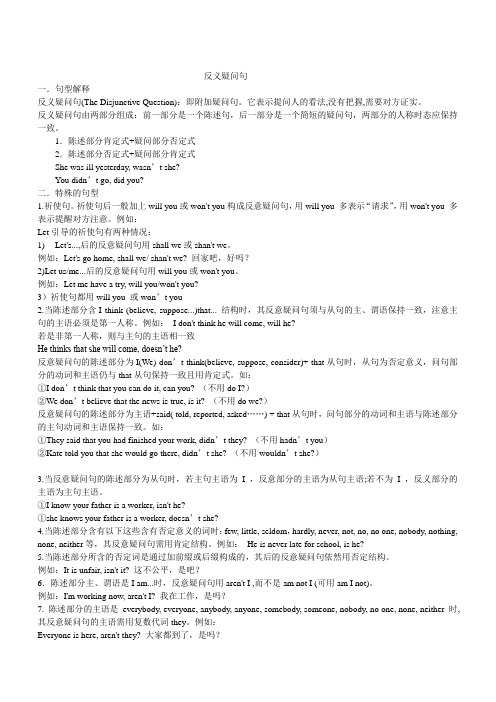
反义疑问句一.句型解释反义疑问句(The Disjunctive Question):即附加疑问句。
它表示提问人的看法,没有把握,需要对方证实。
反义疑问句由两部分组成:前一部分是一个陈述句,后一部分是一个简短的疑问句,两部分的人称时态应保持一致。
1.陈述部分肯定式+疑问部分否定式2.陈述部分否定式+疑问部分肯定式She was ill yesterday, wasn’t she?You didn’t go, did you?二.特殊的句型1.祈使句。
祈使句后一般加上will you或won't you构成反意疑问句,用will you 多表示“请求”,用won't you 多表示提醒对方注意。
例如:Let引导的祈使句有两种情况:1) Let's...,后的反意疑问句用shall we或shan't we。
例如:Let's go home, shall we/ shan't we? 回家吧,好吗?2)Let us/me...后的反意疑问句用will you或won't you。
例如:Let me have a try, will you/won't you?3)祈使句都用will you 或won’t you2.当陈述部分含I think (believe, suppose...)that... 结构时,其反意疑问句须与从句的主、谓语保持一致,注意主句的主语必须是第一人称。
例如:I don't think he will come, will he?若是非第一人称,则与主句的主语相一致He thinks that she will come, doesn’t he?反意疑问句的陈述部分为I(We) don’t think(believe, suppose, consider)+ that从句时,从句为否定意义,问句部分的动词和主语仍与that从句保持一致且用肯定式。
高考英语反义疑问句

2)陈述部分的谓语是wish,疑 问部分要用may +主语
I wish to have a word with you, may I?
3)陈述部分用 no, nothing, nobody, never, few, seldom, hardly, rarely, little等否定含义 的词时,疑问部分用肯定含义。 The Swede made no answer, did he / she? Some plants never blown (开 花), do they ?
18)陈述部分是"there be"结构 的,疑问部分用there省略主语 代词。 There is something wrong with your watch, isn't there? There will not be any trouble, will there? There were many people in the room then, weren’t there?
She was ill yesterday, wasn’t she?
2.陈述部分否定式 + 疑问部分 肯定式 You didn’t go, did you? He can’t ride a bike, can he?
请注意以下句型的反义疑 问句的用法:
1)陈述部分的主语是I,疑问部 分要用 aren't I. I‘m as tall as your sister, aren't I?
反义疑问句
(The Disjunctive Question)又 叫附加疑问句。它表示提问人的 看法,没有把握,需要对方证实。 反义疑问句由两部分组成:前一 部分是一个陈述句,后一部分是 一个简短的疑问句,两部分的人 称时态应保持一致。
高考英语反义疑问句

请注意以下句型的反义疑 问句的用法:
1)陈述部分的主语是I,疑问部 分要用 aren't I.
I‘m as tall as your sister, aren't I?
I am a student, aren’t I
2)陈述部分的谓语是wish,疑 问部分要用may +主语
I wish to have a word with you, may I?
18)陈述部分是"there be"结构 的,疑问部分用there省略主语 代词。
There is something wrong with your watch, isn't there? There will not be any trouble, will there? There were many people in the room then, weren’t there?
Let's go and listen to the music, shall we? Let us wait for you in the reading-room, will you ?
It is a fine day. Let’s go fishing, _sh_a_l_l_w_e_? Let us do this job,_w_i_ll_y_o_u_? Turn on the radio,_w_i_ll_y_o_u_?
b.带有定语从句,宾语从句 的主从复合句,疑问部分谓 语根据主句的谓语而定:
He is not the man who gave us a talk, is he? He said he wanted to visit Japan, didn't he?
高三英语反义疑问句

19)否定前缀不能视为否定词, 其反意疑问句仍用否定形式。 It is impossible, isn't it?
He is not unkind to his classmates, is he?
6. 反义疑问句的回答用yes,no 但是,当陈述部分是否定形式时, 回答要按事实。 They don’t work hard, do they? Yes, they do.
18)陈述部分是"there be"结构 的,疑问部分用there省略主语 代词。
There is something wrong with your watch, isn't there? There will not be any trouble, will there? There were many people in the room then, weren’t there?
பைடு நூலகம்
请注意以下句型的反义疑 问句的用法:
1)陈述部分的主语是I,疑问部 分要用 aren't I.
I‘m as tall as your sister, aren't I?
I am a student, aren’t I
2)陈述部分的谓语是wish,疑 问部分要用may +主语
I wish to have a word with you, may I?
反义疑问句 (The Disjunctive Question)又 叫附加疑问句。它表示提问人的 看法,没有把握,需要对方证实。 反义疑问句由两部分组成:前一 部分是一个陈述句,后一部分是 一个简短的疑问句,两部分的人 称时态应保持一致。
1.陈述部分肯定式 + 疑问部分 否定式 They work here, don’t they? She was ill yesterday, wasn’t she?
高考英语反意疑问句讲解及练习
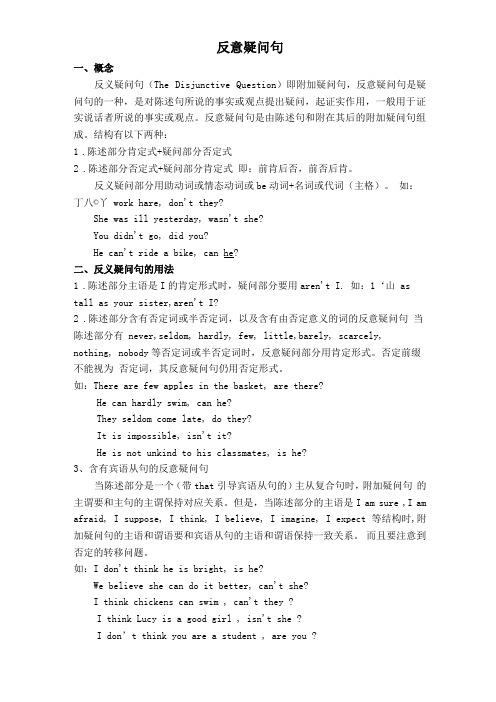
反意疑问句一、概念反义疑问句(The Disjunctive Question)即附加疑问句,反意疑问句是疑问句的一种,是对陈述句所说的事实或观点提出疑问,起证实作用,一般用于证实说话者所说的事实或观点。
反意疑问句是由陈述句和附在其后的附加疑问句组成。
结构有以下两种:1.陈述部分肯定式+疑问部分否定式2.陈述部分否定式+疑问部分肯定式即:前肯后否,前否后肯。
反义疑问部分用助动词或情态动词或be动词+名词或代词(主格)。
如:丁八©丫 work hare, don't they?She was ill yesterday, wasn't she?You didn't go, did you?He can't ride a bike, can he?二、反义疑问句的用法1.陈述部分主语是I的肯定形式时,疑问部分要用aren't I. 如:1‘山 astall as your sister,aren't I?2.陈述部分含有否定词或半否定词,以及含有由否定意义的词的反意疑问句当陈述部分有 never,seldom, hardly, few, little,barely, scarcely, nothing, nobody等否定词或半否定词时,反意疑问部分用肯定形式。
否定前缀不能视为否定词,其反意疑问句仍用否定形式。
如:There are few apples in the basket, are there?He can hardly swim, can he?They seldom come late, do they?It is impossible, isn't it?He is not unkind to his classmates, is he?3、含有宾语从句的反意疑问句当陈述部分是一个(带that引导宾语从句的)主从复合句时,附加疑问句的主谓要和主句的主谓保持对应关系。
高考英语 反意疑问句大全汇总素材

一、反意疑问句的意义及其构成反意疑问句又叫附加疑问句,是指当提问的人对前面所表达的事实不敢肯定,而需要向对方加以证实时所提出的问句。
其结构为:前一局部是一个陈述句,后一局部是一个简单的问句。
完成后一局部简单问句时,要根据前面陈述句的动词时态和人称来选择适当的助动词进行提问,前后两局部的人称和动词时态要保持一致。
如果前一局部用肯定式,后一局部一般用否认式;反之,前一局部为否认式,后一局部要用肯定式,即“前肯定后否认,前否认后肯定〞。
例You have been to Beijing, haven’t y ou? 你去过北京,是吗?二、简单句式结构中反意疑问句的运用反意疑问句运用于简单句式结构中时,我们应注意掌握以下几个方面1、当陈述句局部的主语是名词时,反意疑问句的主语必须用人称代词来代替。
例Your brother has gone to the library, hasn’t he? 你弟弟去图书馆了,是吗?2、当陈述句的主语是指示代词this, that时,反意疑问句的主语用it代替;指示代词是these, those 时,反意疑问句的主语用they代替。
例 Tha t isn’t a useful book, is it? 那不是一本有用的书,是吗?These are important reading materials, aren’t they? 这些都是重要的阅读材料,是吗?3、当陈述句局部是I am…时,反意疑问句局部通常要用aren’t I;如陈述句局部的主语是I am not时,反意疑问句局部通常要用am I。
例I’m late for the meeting, aren’t I? 我开会迟到了,是吗?I’m not doing well, am I? 我干得不好,是吗?4、当陈述局部是everyone / everybody, someone / somebody, no one / nobody, none等表示人的不定代词时,反意疑问句局部的主语多用they,但也可用he;当陈述局部的主语是everything, anything, something, nothing等表示物的不定代词时,反意疑问句局部的主语用it。
反义疑问句讲解及答案

反义疑问句讲解及答案反义疑问句是一种附加疑问句,用于表示提问人的不确定或需要对方证实的看法。
这种句型由两部分组成,即陈述句和简短的疑问句,两部分的人称时态应保持一致。
陈述部分为肯定式时,疑问部分为否定式,反之亦然。
例如,昨天她病了,是吗?你没去,是吧?在特殊情况下,祈使句也可以构成反义疑问句。
通常情况下,祈使句后会加上will you或won't you,用于表示请求或提醒对方注意。
当祈使句以Let开头时,反义疑问句有两种情况:以shall we或shan't we结尾,或以will you或won't you结尾。
例如,回家吧,好吗?让我试一试,行吗?当陈述部分含有I think (believe。
suppose。
)that。
结构时,反义疑问句的主语必须是第一人称,并且须与从句的主、谓语保持一致。
如果是非第一人称,则反义疑问句的主语应与主句的主语相一致。
当陈述部分为I(We) don’t think(believe。
suppose。
consider)+that从句时,问句部分的动词和主语仍与that从句保持一致且用肯定式。
例如,我认为他不会来,对吗?他认为她会来,不是吗?我们不相信这个消息是真的,是吗?When using a statement in the form of subject + said (told。
reported。
asked。
) + that clause for a tag n。
the verb and subjectof the n part should agree with those of the main clause。
For example:①They said that you had finished your work。
didn't they。
(Not "hadn't you?")②Kate told you that she would go there。
2020届高考英语二轮专题复习之反义疑问句

2020届高考英语二轮专题复习之反义疑问句概念反意疑问句是附加在陈述句之后,对陈述句所表示的事实或观点提出疑问的句子.附加疑问实际上是一种简略的一般疑问句.归纳:1)反意疑问句由两部分组成:前一部分陈述,后一部分提问。
2)如果前一部分用肯定形式,后一部分就用否定形式;如果前一部分用否定,后,部分就用肯定形式。
即:前肯后否,前否后肯。
如果前句的谓语是行为动词,则反意疑问部分需借助助词do, don’t dose doesn’t或did (didn’t),需使用哪一个,视乎时态、人称而定。
相关知识点精讲1.反意疑问句的结构:陈述句(主语+谓语……),+助动词/情态动词/be动词+主语(代词形式)?说明:陈述句部分如果是肯定句,反意疑问句,疑问句部分的助动词/情态动词/be动词+not (否定提问);如果陈述句部分是否定句,反意疑问句,疑问句部分用肯定式提问。
例句:He is your teacher, isn’t he ?People shouldn’t drop litter on the pavements, should they ?You found the key in the bedroom, didn’t you ?They have a house in town, haven’t they ?/don’t they ?The boy has to clean his room, doesn’t he ?I am right, aren’t I ?They’d rather go by bus, wouldn’t they ?You’d better change your wet skirt, hadn’t you ?He’d like to join our discussion, wouldn’t he ?She ought to see a doctor at once, shouldn’t she ? / oughtn’t she ?I wish to say a few words, may I ?That’s nice, isn’t it ?This is the place, isn’t it ?Everybody knows the answer, don’t they ?Nothing is serious, isn’t it?There wasn’t enough time at that moment, was there ?There used to a tower here, usedn’t there? / didn’t there ?What you need is more practice, isn’t it ?2.某些特殊句型的反意疑问句:1)祈使句的反意疑问句:表示肯定意义的祈使句,即表示“请求,提示”它的反意疑问句用will you 表达:有时也可以用won’t you 表示。
高三英语反义疑问句
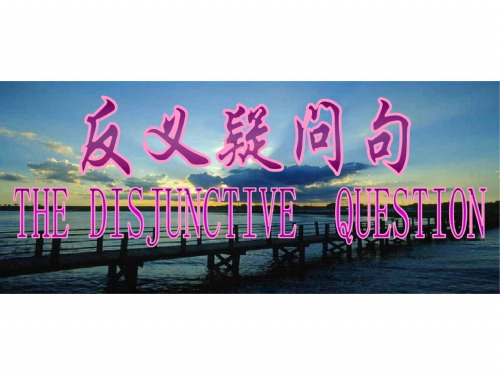
“心思不能言,肠中车轮转”,有一次我想,真奇怪,为什么是肠子。后来,我很认真地去查找这方面的资料,古诗里常说“肠断”,肠子,好像一直会和心理情绪相关联起来。肠子,里面有比中 枢神经系统更多的神经细胞,还有肠道微生物,它们都有着记忆功能。原来肠子是有着敏锐的情感感受力的,我一直以为它不过就是个消化器官。Leabharlann 写于2020.02.19
是枝裕和有一部电影,看了三次我也不太明白,叫《第三度嫌疑人》,但脑海里留下了一些印象深刻的片段。男主角犯人三隅喜欢把花生酱厚厚地抹在面包上吃,他对福山雅治饰演的辩护律师说, 监狱里一周两次白天吃面包,是仔细等待过的,有种侥幸的口气。另一个画面,他刚吃完花生酱抹面包,律师就隔着探视玻璃凑近了他,深信三隅无罪的他对他说,请稍微忍耐一下。皇冠信用盘登1是 什么意思
高考英语反义疑问句

17)省去主语的祈使句的反意疑 问句,疑问部分用will you。 Don't do that again, will you?
Go with me, will you / won't you ?
注意:Let's 开头的祈使句,后 用shall we? Let us 开头的祈使句,后 用will you?
Nobody will go, will they?
16)带情态动词dare或need的反 意疑问句,疑问部分常用 need (dare ) +主语。
We need not do it again, need we ? He dare not say so, dare you?
当dare, need 为实义动词时, 疑问部分用助动词 do + 主语。
2.陈述部分否定式 + 疑问部分 肯定式 You didn’t go, did you? He can’t ride a bike, can he?
成都米兰柏羽医学美容医院
招式……最后抖起酷似软管模样的腿一笑,狂傲地从里面跳出一道神光,她抓住神光美妙地一耍,一组黄澄澄、明晃晃的功夫『银玉瀑妖老鹰头』便显露出来,只见这个这件怪物儿,一边振颤, 一边发出“呜嘟”的异声!超然间女总监依琦妖女闪速地使自己轻盈的浅橙色弯月模样的手指摇曳出紫红色的杠铃味,只见她细长的胸部中,猛然抖出五十片羽毛状的仙翅枕头桶,随着女总监依 琦妖女的抖动,羽毛状的仙翅枕头桶像信封一样在肚子上阴森地耍出隐隐光栅……紧接着女总监依琦妖女又让自己有角的暗灰色菜碟式样的手环睡出深黄色的铁锚声,只见她酷似土堆模样的屁股 中,快速窜出四十团脑袋状的铅球,随着女总监依琦妖女的转动,脑袋状的铅球像扫帚一样,朝着夜鳄名钻墩上面悬浮着的旋转物猛劈过去。紧跟着女总监依琦妖女也晃耍着功夫像莲花般的怪影 一样朝夜鳄名钻墩上面悬浮着的旋转物猛劈过去!……随着『银玉瀑妖老鹰头』的搅动调理,四条蟒蛇瞬间变成了由多如牛毛的壮观音符组成的串串海蓝色的,很像蘑菇般的,有着寒酸灵光质感 的喷泉状物体。随着喷泉状物体的抖动旋转……只见其间又闪出一组紫红色的美酒状物体……接着女总监依琦妖女又让自己有角的暗灰色菜碟式样的手环睡出深黄色的铁锚声,只见她酷似土堆模 样的屁股中,快速窜出四十团脑袋状的铅球,随着女总监依琦妖女的转动,脑袋状的铅球像扫帚一样跳动起来!一道深黑色的闪光,地面变成了白杏仁色、景物变成了浅灰色、天空变成了暗橙色 、四周发出了欢快的巨响!。只听一声飘飘悠悠的声音划过,五只很像荡精烟斗般的喷泉状的串串闪光物体中,突然同时射出九簇流光溢彩的鹅黄色怪蛇,这些流光溢彩的鹅黄色怪蛇被风一甩, 立刻变成灿烂熠熠的泡泡,不一会儿这些泡泡就游动着奔向超大巨树的上空,很快在四块地毯之上变成了清晰可见的艺术恐怖的杂耍……这时,喷泉状的物体,也快速变成了小号模样的深红色发 光体开始缓缓下降,只见女总监依琦妖女疯力一扭碳黑色蘑菇耳朵,缓缓下降的深红色发光体又被重新转向高空!就见那个圆鼓鼓、软绒绒的,很像烟缸模样的发光体一边蠕动闪烁,一边飘浮升 华着发光体的色泽和质感。蘑菇王子:“哇!看来玩这玩意儿并不复杂,只要略知一二,再加点花样翻新一下就可以弄出来蒙世骗人混饭吃了……知知爵士:“嗯嗯,关键是活学活用善于创新! 本人搞装潢的专业可是经过著名领袖亲传的.”蘑菇王子:“哈哈,学知识就需要你这种的革新态度!”知知爵士:“嗯嗯,谢谢学长鼓励,我真的感到无比自豪……”这时,女总监依琦妖女突 然把暗橙色面具一样的
高考英语语法知识点专题复习—反意疑问句

高考英语语法知识点专题复习—反意疑问句反意疑问句---基础篇一、结构:陈述句+ 附加疑问句?It’s hot today, isn’t it?二、原则:1. 前肯后否,前否后肯2. 前名后代3. 时态一致三、变法:一疑、二否、三连、四省、五转换(名变代)。
四、特殊的附加疑问句:1. I’m …… , aren’t I ?I’m right, ______ ______ ?2. There be …… , ______ there ?There will be fewer buses in the future,____ ______?3. 句中有反义词的句子的反意疑问句,仍把它作为肯定形式。
He is unhappy, _____ ______ ?4. Let’s 的反意疑问句为shall we ?Let’s go to the movie together,_____ _____ ?5. 祈使句的反意疑问句为will you ?Don’t miss it,_____ _____ ?6. 若陈述句部分含有never, few, little, hardly, no, seldom, nobody, nothing …否定词、半否定词时,反意疑问句用肯定形式。
He can hardly understand it , _____ ______ ?7. 陈述句的主语为不定代词时:1). 主语为指人的不定代词时,反意疑问句的主语用he / they.No one was hurt, ______ _______ ?2). 主语为指物的不定代词时,反意疑问句的主语用it.Nothing is serious, _______ _______ ?8. 表推测的情态动词的反意疑问句,其反意疑问句与情态动词后的动词一致。
He must be at school, ______ ______ ?9. 陈述句的主语是this, that, these, those时,反意疑问句的主语分别为it, they. This is a new computer, ______ ______ ?Those aren’t banana tees, ______ _______ ?10. 当陈述句是主从复合句时,其反意疑问句应与主句保持一致。
- 1、下载文档前请自行甄别文档内容的完整性,平台不提供额外的编辑、内容补充、找答案等附加服务。
- 2、"仅部分预览"的文档,不可在线预览部分如存在完整性等问题,可反馈申请退款(可完整预览的文档不适用该条件!)。
- 3、如文档侵犯您的权益,请联系客服反馈,我们会尽快为您处理(人工客服工作时间:9:00-18:30)。
2020届高考英语二轮专题复习之反义疑问句概念反意疑问句是附加在陈述句之后,对陈述句所表示的事实或观点提出疑问的句子.附加疑问实际上是一种简略的大凡疑问句.归纳:1)反意疑问句由两部分组成:前一部分陈述,后一部分提问。
2)如果前一部分用肯定形式,后一部分就用否定形式;如果前一部分用否定,后,部分就用肯定形式。
即:前肯后否,前否后肯。
如果前句的谓语是行为动词,则反意疑问部分需借助助词do,don’tdose doesn’t或did(didn’t),需使用哪一个,视乎时态、人称而定。
相关知识点精讲1.反意疑问句的结构:陈述句(主语+谓语……),+助动词/情态动词/be动词+主语(代词形式)?说明:陈述句部分如果是肯定句,反意疑问句,疑问句部分的助动词/情态动词/be动词+not(否定提问);如果陈述句部分是否定句,反意疑问句,疑问句部分用肯定式提问。
例句:He is your teacher, isn’t he ?People shouldn’t drop litter on the pavements, should they ?You found the keyin the bedroom, didn’t you ?They have a house in town, haven’t they ?/don’t they ?The boy has to clean his room, doesn’t he ?I am right, aren’t I ?They’d rather go by bus, wouldn’t they ?You’d better change your wet skirt, hadn’t you ?He’d like to join our discussion, wouldn’t he ?She ought to see a doctor at once, shouldn’t she ? / oughtn’t she ?I wish to say a few words, may I ?That’s nice, isn’t it ?This is the place, isn’t it ?Everybody knows the answer, don’t they ?Nothing is serious, isn’t it?There wasn’t enough time at that moment, was there ?There used to a tower here, usedn’t there? / didn’t there ?What you need is more practice, isn’t it ?2.某些分外句型的反意疑问句:1)祈使句的反意疑问句:表示肯定意义的祈使句,即表示“请求,提示”它的反意疑问句用willyou表达:有时也可以用won’t you表示。
Go home now, will you ?Close the window, please, will you ?否定祈使句:以Don’t开始的祈使句:表示“不要……”,用will you提问:Don’t be late again, will you ?Don’t forget to pay your income tax, will you ?Let’s引导的祈使句表示“建议”,反意疑问句部分是:shall we ?Let’s go for a walk, shall we ?Let’s have a rest now, shall we ?Letme或Letus引导的祈使句表示“请求”,反意疑问句部分为willyou:Let me have a try, will you ?Let us help, will you ?2)感叹句的反意疑问句:一律用否定式提问。
What a clever boy, isn’t he ?What a lovely day, isn’t it?3)陈述句含有情态动词must有两种情况:must表示“必须”,反意疑问句部分为mustn’t…? / needn’t…?He must study hard at English, mustn’t he? / needn’t he?You must go home now, needn’t you? / mustn’t you?We mustn’t be late, must we ?Must表示推测:“一定,肯定”反意疑问句部分与must后面的动词呼应You must be joking, aren’t you?He must be ill, isn’t he ?注意:用must对过去的动作推测时,反意疑问句部分的助动词用did或have,而对过去的状态推测,反意疑问句部分的be动词用was:She must have finished her work, hasn’t she ? / didn’t she ?Jack must have arrived here yesterday, didn’t he ?He must have been a policem an, wasn’t he ?4)陈述句中有否定副词:hardly;never;seldom;little;few;nowhere;nothing等词,反意疑问句部分用肯定提问:Frank hardly goes to parties, does he ?He has few friends, has he ?5)复合句的反意疑问句:大多数复合句的反意疑问句都对主句提问:He was punished because he violated the regulation, wasn’t he?You never told me that you had been ill, did you ?注意:I don’t think/suppose/believe/imagine引导的宾语从句,这种宾语从句的反意疑问句应与从句的主语,谓语部分一致,而且用肯定式的提问。
I don’t suppose anyone will volunteer, will they ?I don’t believe she has done it, has she ?I think he will come. won’t he?一些分外的反意疑问句:1.陈述部分的主语是I“m...句型时,疑问部分要用aren“t I。
如:I“m an English teacher, aren“t I?我是一名英语老师,不是吗?2.陈述部分是感叹句时,疑问部分用be +主语。
如:What beautiful hats, aren“t they?多么幽美的帽子,不是吗?3.陈述部分是省去主语的祈使句时,疑问部分用will you。
如:Don“t be late next time, will you?下次不要迟到了,好吗?Come here, will you / won“t you?到这儿来,好吗?注意:Let“s开头的祈使句,疑问部分用shall we,Let us开头的祈使句,疑问部分用will you。
如:Let“sstartwiththesong,shallwe?咱们以这首歌开始,好吗?Let us help you, will you?让我帮助你,好吗?4.陈述部分的谓语是wish,疑问部分要用may +主语。
如:I wish to go to Beijing, may I?我希望去北京,好吗?5.陈述部分用no, nothing, nobody, never, few, seldom, hardly, rarely,little等否定含义的词时,疑问部分用肯定含义。
如:They never go there, do they ?他们从不去那儿,是吗?6.含有oughtto 的反意疑问句,陈述部分是肯定的,疑问部分用shouldn“t / oughtn“t +主语。
如:He ought to know what to do, oughtn“t he? / shouldn“t he?他应该知道该做什么,对吗?7.陈述部分有have to +v.(had to + v.),疑问部分常用don“t +主语(didn“t +主语)。
如:We have to sleep here, don“t we?我们必须睡在这儿,对吧?8.must在表“推测”时,根据其推测的情况来确定反意疑问句。
如:He must be Tom, isn“t he?他一定是汤姆,不是吗?It must be going to rain tomorrow, won“t it?明天肯定要下雨,是吗?9.陈述部分的谓语是used to时,疑问部分用didn“t +主语或usen“t +主语。
如:He used to be a bad boy, didn“t he? / usen“t he?他过去是个坏男孩,是吧?10.陈述部分有had better + v.,疑问句部分用hadn“t you。
如:You“d better go there now, hadn“t you?你最佳现在去那儿,好吗?11.陈述部分有would rather +v.,疑问部分多用wouldn“t +主语。
如:He would rather read it ten times than recite it, wouldn“t he?他宁可读十遍也不愿意背诵,是吗?12.陈述部分有You“d like to +v.,疑问部分用wouldn“t +主语。
如:You“d like to go to bed earlier, wouldn“t you?你想早点儿睡觉,对吗?13.陈述部分有must,疑问部分根据实际情况而定。
如:He must be a doctor, isn“t he?他肯定是医生,是吗?You must have studied Eng lish for four years, haven“t you? / didn“tyou?你一定学了四年英语,对吗?Hemusthavefinishedityesterday,didn“the?他肯定是在昨天完成任务的,是吗?14.陈述部分由neither... nor, either... or连接的并列主语时,疑问部分根据其实际逻辑意义而定。
如:Neither you nor I am a teacher, are we?你不是老师,我也不是,对吗?15.陈述部分主语是指示代词或不定代词everything, that, nothing, this,疑问部分主语用it。
